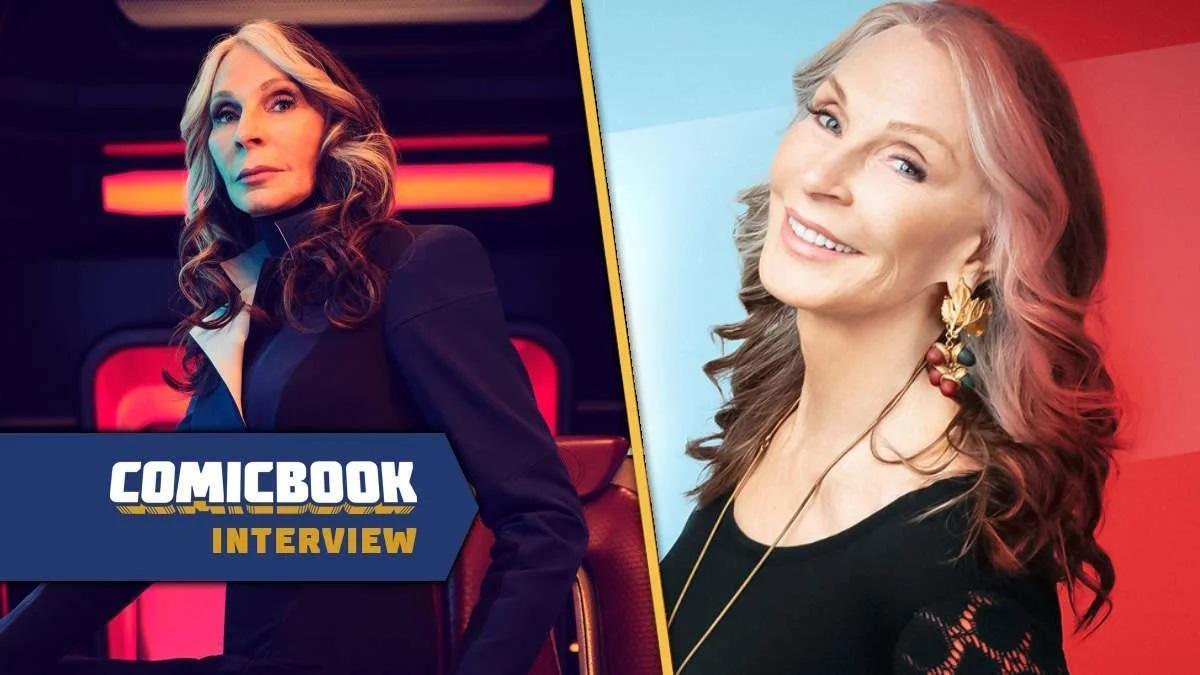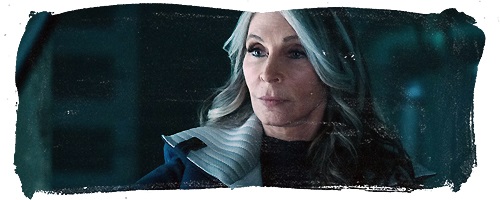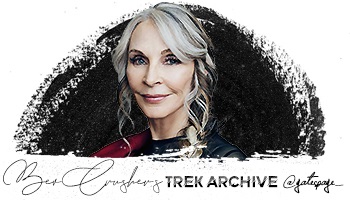
Jamie Lovett
March 13, 2023

In 2022, Gates McFadden entered the podcasting space by hosting InvestiGates: Who Do You Think You Are?, produced by The Nacelle Company’s podcasting division, NacelleCast. In her first season, she mostly interviewed her friends and co-stars from Star Trek: The Next Generation, who she reunited with while reprising Dr. Beverly Crusher in Star Trek: Picard Season 3. In InvestiGates‘ second season, McFadden expands into conversations with stars from throughout Star Trek’s history, including original Star Trek icon William Shatner, Star Trek: Lower Decks star and fellow podcast host Tawny Newsome, and Star Trek: Voyager‘s Kate Mulgrew. While McFadden and her guests all have ties to Star Trek, the conversations cover varied topics, from aging and mortality, to show business at large, to religion and spirituality.
ComicBook.com had the opportunity to speak with McFadden about how the podcast has changed in its second season. She also touches on her return to Star Trek in Star Trek: Picard Season 3, revealing that she broke a memorable prop in the first episode.
Jamie Lovett, ComicBook.com: What would you say is the biggest difference between this season and the first one? Either for you in doing it, or for how it ended up turning out?
Gates McFadden: Well obviously the first group, season, was mainly people who I was very close to, in particular the people from TNG. I had known Nana and Picardo from all the different times I’ve met them at conventions and I’ve had dinner with them and we know each other. My TNG people we’re like family. We have argued, we have made up, we have laughed ourselves silly, and we’ve worked together, so it’s a very strong bond.
What’s been new territory is interviewing people like Bill Shatner or Jack Quaid, people who I’ve met but I don’t know. But I obviously know Bill Shatner’s work, and he’s done so much work. I was amazed that he agreed to do the podcast. I was honored that he would come on and spend time with me. He’s done more podcasts probably than any human being, and he hadn’t been doing them for quite a while or just being very, very selective. So I was very happy that he gave me the time.
And I learn so much about people when I’m researching them and then with the questions that I ask them, and then you also see where they go with it. Sometimes they come up with questions that are quite amazing that they’re asking me about, so I think that’s the part that I’m learning. I’m on a big learning curve with this, Jamie. I mean I really don’t consider myself an expert at podcasting. I just am trying to see how this works and see if I can get to know people better and ask questions that they might not have been asked before. And you know better than me whether it’s working or not.
I listened to the first three episodes of this season, including the most recent one with Kate Mulgrew. As a lapsed Catholic myself it was very interesting listening to you two talk about religion and things like that. Which might not be what people expect.
Well, exactly. There’s a couple of huge blowups on Twitter because of the conversation. What’s difficult is if you were sitting in a room yourselves and the fires going and you’re having a glass of wine, you might talk for four hours about topics like this. It’s very tricky to edit, and a lot of times I feel, “Oh, that was too surface. I should have just not even gone into that”. But again, I’m learning. You either want to try to learn something or you don’t, and I do want to learn something. And I notice when I go into the same old, same old, If something doesn’t work, it’s usually my fault, not my guests. But it’s tricky, as I’m sure you know, to try to figure out what’s going to get someone to open up. Am I not letting them speak? Am I not listening enough? And I make those mistakes all the time, but you just have to keep going forward and learning. And so far, I’ve learned some really constructive things.
I spoke to you when the first season of the podcast debuted, and you talked about how you wondered if speaking to people that you had less of an intimate relationship would actually be easier because there wasn’t a preexisting vulnerability that you were worried about exploiting, for lack of a better term. Did you find that to be the case?
That’s such a good question. No, I think. Yes and no. How about that? The yes part is that I could research, and I genuinely had all these things I didn’t know about them so I could try to ask that question. On the other hand, if there was an easy connection you could get in deep very quickly. No, that’s not right. What am I trying to say here? Well, for example, Kate Mulgrew. I’ve met her many times, but we’ve never really had any conversation. We don’t have to go out and have dinner like I do with my friends in the first cast. So you’re both getting to know each other and it’s also being recorded. So again, it’s a tricky thing. I’m not trying to do any sort of expose. I’m trying to actually make it an interesting conversation for myself, for her. That’s the first thing is just for us to have an interesting conversation. I don’t want it to be agony for the person I’m talking to.
And then it’s taking time for me to understand even what listeners might want. I don’t think my energy about this is, “I want to be the best podcaster in the world”. I don’t have that kind of ambition about it. I want to try to be open. I want to learn how to listen better. I think I have many things I can learn by engaging in the process of doing a podcast. I can learn about the person, I can learn about myself, I can learn about how people feel when they listen to it. So I feel like I’m still quite a neophyte. There is a difference, though. Maybe I haven’t quite qualified what that difference is.
I just edited Rosalind Chao and we’re not in touch all the time, she’s just somebody I had a real connection with and I’ve wanted to talk to, so it was so pleasurable. Whether people listening to it will find what we talk about interesting, that I don’t know. Do you see what I mean? I’m not somebody who looks at, “Okay, this is what the algorithms tell me people didn’t like that I talked about.” I haven’t gotten to that, I don’t know if I ever will. That’s just sort of not how I function.
That conversational aspect I think is one of the things that’s appealing about it. I was almost surprised by how much your guests ask questions of you as well. Was that something that you planned on, or hoped for, or were you surprised by how often the conversation had got turned around?
No, I wanted that. I wanted that because I’m not trying to be the interviewer. I’m not a journalist, I’m not somebody who is doing an expose. Those are people who have very particular skills and they know what they’re doing and they’re working on it in a certain way. I’m trying to have a conversation and get to know somebody or get to know something about a friend who I thought I knew very well that maybe I didn’t know. That’s what I’m trying to do. And one of the tricky things is I don’t want it to just be we’re sitting and talking about current events and just going through everything. I wanted to get away from that somewhat. Sometimes it’s impossible to get away from, but I wanted it to be, really, about two people talking as much as I was able to do. Really, I want to share things. And all of us are making judgments. “Wait, do I want to share this on something that’s going to be public or not?”. There’s one point Anson said, “Yeah, I’d tell you, but I’m not going to talk about it here”. And that’s the truth of it, because we are recording. This is going to go out to the public. So I want to protect people and protect myself, but I also want it to be something that reveals. That’s tricky.
You mentioned being surprised sometimes by the conversations you end up having with people you know the last I spoke to you about the podcast. Was there a particular interview or conversation that stood out from this season that surprised you?
Yeah. I think pretty much most of them, actually. Because I never know where it’s really going to go to. Yeah, like as I said with Rosalind, we had so many connections with our children. She has a child who’s a cellist, I have a son who’s a violinist, and so I had no idea. And I thought, “How could I not have known that?” Because we could have complained to each other so much. But it was things like that that I don’t know how much it would be fun for us to go into deep conversations about the trials of being a parent of a musician or something, or how proud we are. I mean that’s not going to be necessarily the most interesting conversation for people to listen to. But I was excited to know that, “Oh good. So I’m going to be talking to her about this in the future. We can be emailing about this.” And that’s fun.
But it was a very different season because I didn’t know people as well. And so I think it’s going to be up to the listeners to tell me how they felt about it, because it’s hard for me to judge, certainly at this point, when they’re not even all finished in terms of editing, to tell you what the difference is.
You went from interviewing friends you made working on Star Trek: The Next Generation, to people you are less familiar with from throughout the Star Trek franchise. Are you hoping to eventually branch out even further from that to people that you don’t share that Star Trek experience at all?
Well, when I went into it I turned it down twice, as you know, so I didn’t have a thing like, “Oh I want to talk about avant-garde theater, so I’m going to ask all the directors that I’ve admired for decades to be on this podcast”. That’s a whole other thing. I was hired and asked by Nacelle’s CEO, Brian Volk-Weiss. He wanted me to talk to Star Trek people. He said, “I’m not going to limit you to that, but that’s really what I’m interested in.” So my first seasons, I certainly have enough Star Trek actors who interest me that I would like to learn about. And I’m very in love with all the new shows and the new people who are on these shows. So yeah, I would love to have sit-down conversations with these people just in life. I meet them at conventions, or you run into somebody in the bathroom and you go, “Hey, congratulations on your show”. And they’re wonderful people. Like, Sonequa is an amazing actor. I would love to talk with Sonequa. I can’t believe Discovery‘s just been canceled, but it has.
But Star Trek podcasters do a much better job at analyzing the Star Trek world than I do. I have learned by listening to Trek podcasts about, “Oh, that’s what the episode… I get it. Oh, how interesting.” I’m always amazed at how people analyze them. Sometimes I agree, sometimes I don’t, but it’s remarkable how in-depth the analyses are.
I’m just trying to have conversations. I don’t think I have a plan for doing a podcast. There are a lot of people I’d like to speak to, some of my old good friends who are now doing extremely well. I would love to talk to them because we had years of life together before they became famous in their fields.
But I’m not seeing myself as a podcaster for life. I’m seeing myself as somebody who’s learning a lot by doing it now. I have to see if people want to keep hearing it. I’m curious to know what people are going to think after the second season.
Do you think eventually you’ll end up sitting down with Patrick Stewart? Obviously, you worked together on Star Trek: The Next Generation and its movies, and more recently in Star Trek: Picard Season 3.
Well, that’s an interesting thought. It’s not in this season so far, but that’s an interesting thought. It actually crossed my mind a few times. I know he has his book coming out, which is a memoir, so I knew he didn’t really want to do anything before his memoir was out. But we’ll see. I don’t have any specific plans. I’ve recorded all of season two already, but I’m working on the sound editing. We’ll see. I think it really depends on whether people are still interested, that would be my hunch.
Speaking of Star Trek: Picard Season 3, I don’t know if you’ve seen the reactions online, but people are still talking about that third episode and the conversation between the two of your characters about Jack Crusher, those fantastic performances. And then Episode 4 is one that I’ve described as being like a Next Generation episode in disguise, and I love that Beverly Crusher is the cornerstone of it. Almost ironically, she’s the one doing the science and Star Trek stuff while all the male characters are dealing with the emotional parenting stuff.
Oh, I love that you said that. That’s great.
Now that it is coming out and these reactions are coming out, how are you feeling about having shot the season? You’ve talked in other interviews about how the character that was pitched to you by Gene Roddenberry was different than the character you came back to in Star Trek: The Next Generation Season 3. Do you feel like you got to find her again this season?
I feel that it’s a much more interesting character. I think she’s really three-dimensional. She’s got flaws, but she’s got all the science and technology and she really is looking for solutions in her own life, in her son’s life, in the world, and in the world of science and technology and trying to help make the world a better place, the universe a better place. So yeah, I think she’s a very fascinating character, and I feel you understand that she’s very competent. I love that. And she’s an explorer, and I love the fact of how it began, the season, by showing that she’s somebody who can really, as everyone on that spaceship would have to be, you’d have to know how to do so many different things in case of an emergency. You have to know some engineering, you have to know some medical science, you have to know how to drive the ship, you have to be able to do many different things and also to defend the ship. So I like having a female, who is not a spring chicken, being able to be engaged like that. I love it.
I appreciate knowing that Beverly knows her way around a pump-action phaser rifle.
Well, I’ve gotten so many comments. Even my son was like, “Oh, what a riot. They don’t have something different now?” But I think the point was they were trying to show that she’s on an older ship, there’s all sorts of things like that going on, and that makes sense. But it was fun. Of course, I broke the prop, did you know that?
I didn’t know that.
I broke the prop because I was doing it so real that they’re going, “No, take it easy Gates. This is just a prop. You have to be very gentle when you’re acting like you’re really killing it”. So yeah, I get into it.














